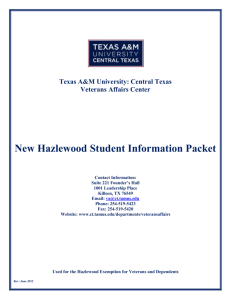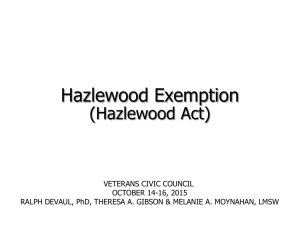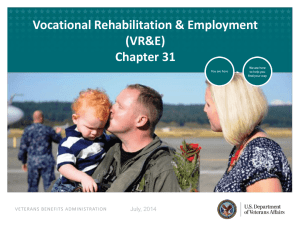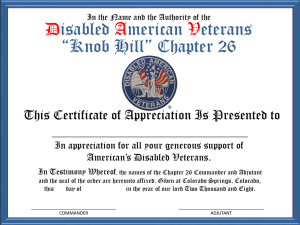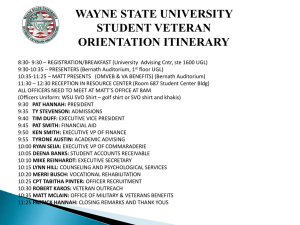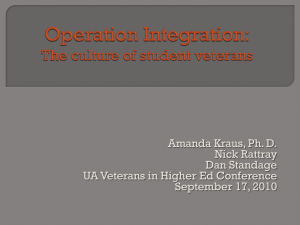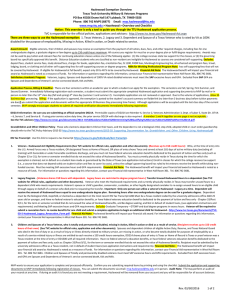Waivers - TASFAA
advertisement
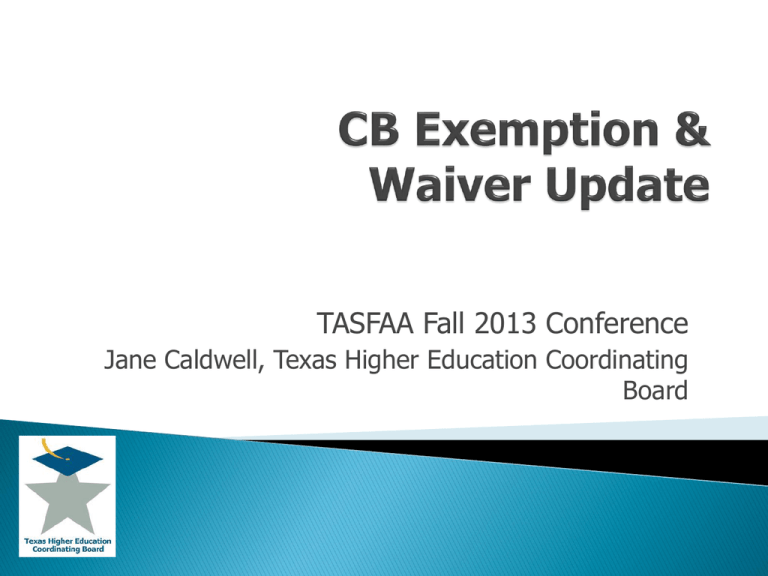
TASFAA Fall 2013 Conference Jane Caldwell, Texas Higher Education Coordinating Board Exemptions let “special groups” of Texas residents or nonresidents pay less tuition and/or fees. Waivers allow “special groups” of nonresidents to enroll and pay a reduced nonresident rate. Optional programs give institutions the right to choose not to award them. However, if the institution makes such awards, it must make them to all eligible students. Mandatory programs, by statute, require institutions to grant awards to all who meet the qualifications. Selective Service Registration required at institutions other than community colleges if tuition is reduced. 2 HB1025 –$30 million to reimburse Legacy costs SB220 – different way to ID eligible volunteer fire departments; new citations SB1158 – amends Hazlewood; transfers administration to Texas Veterans Commission SB1159 – establishes new requirements RE readmission of military personnel to graduate programs; calls for LBB to conduct Hazlewood study SB1210 – adds requirements for continuation awards through certain exemption and waiver programs 3 Go to Texas Legislature Online ◦ ◦ ◦ ◦ ◦ ◦ http://www.capitol.state.tx.us/BillLookup/BillNumber.aspx Enter bill number (example, SB215) Set “information type” as “text” Select “legislature” of “83(R) – 2013” Press “submit” Select the enrolled version of the text, and you can print the bill as it was passed. 4 If we have rulemaking authority, we can help you interpret statute and rules. See handout to ID programs for which the CB has rules. If we do NOT have rulemaking authority, we will gladly share our thoughts, but our opinions hold no more authority than do yours. In all cases, the application of statutes to individual cases is in your hands. 5 Goes into effect in fall 2014 Applies to continuation awards only (2nd term+) REQUIREMENTS: After receiving an initial award, to receive a continuation award, a student must : ◦ As a undergraduate or graduate student, meet the school’s financial aid GPA requirement for meeting academic progress (with hardship exceptions) ◦ At start of undergrad term, have not completed a number of hours considered excessive under TEC§54.014, unless permitted to do so by the institution on a showing of good cause 6 Does NOT apply to: ◦ ◦ ◦ ◦ Dual credit exemptions (TEC 54.216; TEC 130.008) Foster care exemption (TEC54.366) Ex-prisoners of war (TEC54.342) Children or spouses of veterans killed in action, missing in action, or who died as a result of a service-related illness or injury; (TEC54.341(a-2)(1)(A), (B), (C), or (D) or (TEC54.341(b)(1)(A), (B), (C), or (D)) * ◦ Waivers that let nonresidents pay resident tuition *DOES apply to vets, children/spouse of disabled veterans (TEC54.341(a-2)(1)(E) or TEC54.341(b)(E)) and Legacy students. 7 Does NOT apply to waivers that let nonresidents pay resident tuition DOES apply to other waiver programs: ◦ 100 mile waiver, that lets nonresidents pay as little as resident tuition +$30/hour ◦ Border state/border county waivers that base tuition rates on reciprocity – what Texas students would pay if attending a similar institution in the other state/county ◦ Other programs that allow “lowered” rates if your institution does not lower them to the resident rate ◦ Good Neighbor Scholarship 8 Applies to undergraduates and graduates Based on financial aid GPA requirements Hardship overrides allowed, based on: ◦ Student’s severe illness or debilitating condition that affects student’s performance ◦ Student’s responsibility for the care of sick, needy person that affects student’s performance ◦ Student’s active duty or other service in US armed forces or Texas National Guard ◦ Other good cause acceptable to institution 9 Applies to undergraduates only. “Excess hours” = 30 hours in excess of the student’s degree requirements Count of hours is the same as the count of hours for determining formula funding eligibility Institution can exercise professional judgment on a showing of good cause 10 Applies beginning with continuation awards for fall 2014 PLEASE warn your students that this change is coming, especially those who are not on course to meet the requirements No Grandfathering 11 New TEC 54.2002: Notwithstanding any other law, a mandatory or discretionary exemption or waiver from the payment of tuition or other fees under this subchapter or another provision of this code applies only to courses for which an institution of higher education receives formula funding. Note: Provision already exists in TEC 54.545, but this wording is simpler to understand 12 Appropriates $30M to the CB for reimbursing institutions for a portion of their costs from the Hazlewood Legacy Program CB is to allocate funds based on each school’s proportionate share of Legacy costs in FY2012, as reported through student records in the Hazlewood Exemption Program Database Funds will be issued to institutions for use in the 20142015 biennium to offset Legacy costs 13 Some HAZ program changes effective fall 2014: ◦ “Permanently disabled” or individually unemployable ◦ Proof of eligibility is due by last class date of term (not within a year) ◦ Vet who assigns hours through Legacy can revoke the assignment ◦ Academic progress for Legacy limited to financial aid GPA ◦ <=25 age limit only applies to Legacy Administrative changes in progress now ◦ Program transferred from CB to TX Veterans Commission ◦ CB rules adopted by TVC; more to come from TVC 14 Rufus Coburn, Director, Veterans Education rufus.coburn@tvc.texas.gov; (512) 463-6160 Murel Miller, Deputy Director, Veterans Education murel.miller@tvc.texas.gov; (512) 463-6441 Texas Veterans Commission ◦ P.O. Box 12277 | Austin, TX 78711-2277 ◦ Fax (512) 463-3932 15 Study of Hazlewood is to result in a report to the Legislature due by December 1, 2014 To be conducted by the Legislative Budget Board, in consultation with the Coordinating Board and Texas Veterans Commission. “Institutions of higher education shall cooperate with the LBB by providing any requested data and ensuring the reliability and validity of the data collected and submitted for the purpose of the study.” 16 Data gathered is to be disaggregated by population served -- veteran, dependent, spouse, and Legacy Data named in the bill includes: ◦ # by race, ethnicity, institution, FAFSA data ◦ Undergraduate, graduate, and doctoral hours attempted and earned per term ◦ Degrees attempted and earned & associated hours ◦ GPAs per year ◦ Time to degree; 4- and 6-year grad rates ◦ Developmental education hours taken + 17 Unless hardship waivers are granted, the financial aid GPA requirement for undergraduate and graduate students and excess hour cut-off time for undergraduate students WILL apply to: ◦ Veterans using Hazlewood ◦ Spouses of veterans disabled from service-related injuries or illness ◦ Children of veterans disabled from service-related injuries or illness ◦ Legacy students (adds excess hour restriction) 18 1. Are the following exemptions mandatory or optional? a) c) 2. 3. Foster care Valedictorian b) d) Blind/deaf Hazlewood True or False? SB1210 adds FA SAP to all exemptions and waivers. A foster care exemption recipient has completed 110 of 120 hours of his/her degree plan and registers for 15 hours. Can he/she receive the exemption? 19 My GPA dropped because I was in a car accident. Can I still get my continuation exemption? True or False. The GPA requirement from SB1210 applies to undergraduates and graduates; the hour limit restriction only applies to undergraduates. True or False. If it is a mandatory exemption, you must grant it, even if the student’s GPA is below the minimum. True or False. Beginning in fall 2014, Hazlewood applicants no longer have a year to prove eligibility. 20 For your hard work, cooperation, and devotion to your students.
